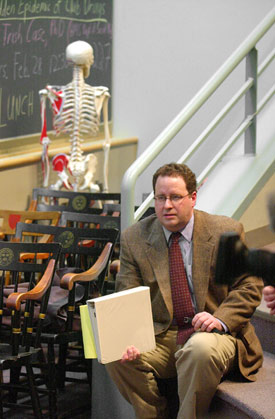Money for organs discussed in panel
Panel debates hope, horrors of organ donation

Lifting the U.S. ban on paid organ donations might help meet the desperate need of thousands of sick and dying recipients, but some fear it would also expand a thriving international market that already views the poor as little more than a source for spare parts.
A panel of four experts on the topic debated the issue at Harvard Medical School last Thursday (March 14) before a crowd of about 60 in the Medical Education Center amphitheater. The forum was sparked by a recent report of an American Medical Association (AMA) committee that said financial incentives ought to be considered as a way to increase the rate of organ donation in this country.
The medical ethics forum, “Organs for Sale? The Economics of Altruism,” featured Frank Riddick, chair of the AMA’s Council on Ethical and Judicial Affairs; Clive Callender, chief of transplant surgery at Howard University and chair of the Committee on Minority Affairs for the United Network for Organ Sharing; Nancy Scheper-Hughes, an anthropology professor at the University of California, Berkeley and director of Organs Watch, an international human rights organization that documents organ trafficking worldwide; and Margaret Lock, McGill University anthropology professor and member of the International Forum for Transplant Organs.
Walter Robinson, professor of pediatrics at Children’s Hospital and associate director of the Division of Medical Ethics, moderated the discussion.
Riddick, who helped put together the AMA report, said the conclusion was that the issue ought to be scientifically studied to see if financial incentives could increase the rate of donation without doing harm in other areas, such as encouraging illegal organ sales. The report, which he stressed has not become AMA policy, recommends that financial incentives be tested for donations from dead, not living donors.
Riddick said there are 80,000 people on waiting lists and only 14,000 potential donors each year. Of those 14,000, just 6,000 become donors. Earlier efforts to increase the rate of organ donation through education and through organ donor drives have failed, he said, as evidenced by the rate remaining flat for the past three years.
“Our decision was that maybe it’s time to try to look at some other ways to bring up the rate,” Riddick said.
Any payment, he said, should be in the form of a contract struck with a living donor and payable to his or her estate after death. The payment, he said, should be just enough to provide an incentive.
“The payment should be more in the nature of a thank-you than a bribe,” Riddick said. “Payments should be limited to the smallest amount that might influence people.”
Riddick said concerns have already been expressed about the idea, with some worried that it would drive up the cost of care or that it would spark a bidding war where the rich bid for organs from the poor.
That already happens in some places, said Scheper-Hughes, who said she has visited villages in Moldova and the Philippines where the poor commonly sell organs, either willingly or after being tricked. The international marketing of organs involves organized crime, in some cases, she said, and even has people traveling to nations where the practice is legal to receive life-giving operations.
Legalizing the sale of organs in the United States will legitimize what most Americans consider an unethical practice, she said, and feed the international trade in organs.
Scheper-Hughes said people reject donating a loved relative’s organs for many reasons, most of which are not financial. People object because of religious beliefs, because of the value they put on the integrity of the body, or because they’re reacting emotionally to the loss of a loved one. Some simply distrust the medical establishment.
She said a first step ought to be adoption of a national health system, that way poor people getting substandard or no medical care might look a bit more kindly on a request their dying loved one donate part of their body.
“[There’s a] contradition in asking poor people in this country to donate organs when they and their relatives might not even have basic health care,” Scheper-Hughes said. “I see the AMA proposals as deeply flawed and dangerous.”
Riddick said the AMA has not yet accepted the proposal and has sent the AMA Council on Ethical and Judicial Affairs back to work on the issue.
The issue is being debated at the AMA and elsewhere because organ transplantation touches a deep nerve in all of us, Robinson said in introducing the panel. It represents both our hopes for a better, longer life, and our anxiety about a potential disaster wrought by runaway technology.
“It is the sort of thing that occupies both our hopes and our fears. On the one hand it’s the gift of life and on the other it’s the stuff of nightmares,” Robinson said. “Everyone, when we talk about transplant, has the name Frankenstein in the back of their minds.”




